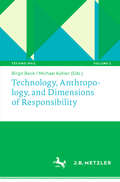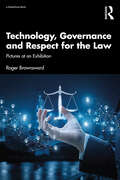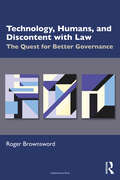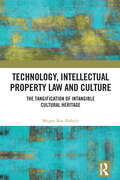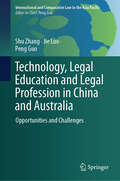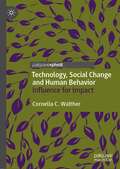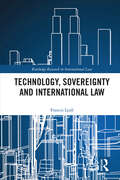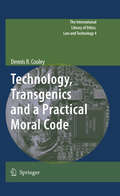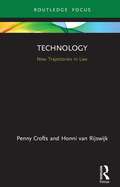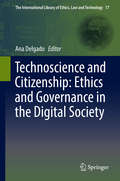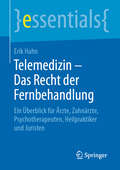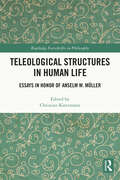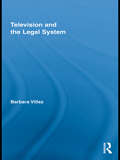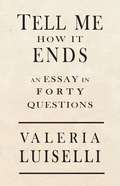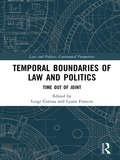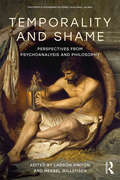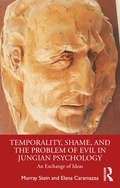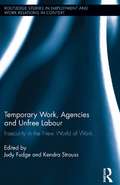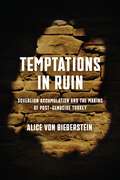- Table View
- List View
Technology, Anthropology, and Dimensions of Responsibility (Techno:Phil – Aktuelle Herausforderungen der Technikphilosophie #1)
by Michael Kühler Birgit Beck“With great power comes great responsibility.” In today’s world, with our growing technological power and the knowledge about its impact, we are considered to be responsible for many instances that not long ago would have been deemed a matter of fate. At the same time, the looming options of, e.g., genome editing or neuroprosthetics, threaten traditional notions of responsibility if no longer the person but the technology involved is deemed to be responsible for a specific behaviour. The growing ethical debate on the expansion of human responsibility, e.g. when it comes to human-machine-interaction, ambient intelligence, or reproductive technologies, thus intertwines with the challenge to formulate an appropriate understanding of the concept of personal responsibility and our respective anthropological self-understanding in today’s technological world. The volume brings together both perspectives and aims at illuminating crucial dimensions of responsibility in light of technological innovation and our self-understanding as responsible beings.
Technology, Governance and Respect for the Law: Pictures at an Exhibition
by Roger BrownswordIn the context of the technological disruption of law and, in particular, the prospect of governance by machines, this book reconsiders the demand that we should respect the law, simply because it is the law. What does ‘the law’ need to look like to justify our respect? Responding to this question, the book takes the form of a dialectic between, on the one side, the promise of the prospectus for law and, on the other, the discontent provoked by the performance of law in practice; this is followed by a synthesis. Four pictures of law are considered: two are traditional pictures – law as order and law as just order; and two are prompted by the technological disruption of law – law as governance by machines and law as self-governance by humans. These pictures are tested in five performance areas: contract law, criminal law, biolaw, information law, and constitutional law. The synthesis, revealing the complexity of the demand for respect, highlights three particular points. First, the only prospectus for law that clearly commands respect is one that is committed to protecting the global commons (the preconditions for humans to form their own communities with their own forms of governance); second, any form of governance by humans will invite reservations and push-back against the demand for respect; and, third, governance by machines is not so much a superior form of governance as a radically different form in which questions about respect are redundant. This book will appeal to scholars and students with interests in the broad and burgeoning field of law, regulation and technology, as well as to legal theorists, practitioners, and others interested in the impact of new technology on law.
Technology, Humans, and Discontent with Law: The Quest for Better Governance
by Roger BrownswordThis book analyses discontent with law and assesses the prospect of better governance by technology. In the first part of the book, where the context is ‘low tech’, the range of discontent with law is examined; the underlying reasons for such discontent are identified (namely, the human nature of the legal enterprise, its reliance on rules, and the pluralistic nature of human communities); and the reasonableness of such discontent is assessed. In the second part of the book, where the context is ‘high-tech’ (with new tools becoming available to undertake governance functions), the question is whether discontent with law is further provoked or, to the contrary, is eased. While new technologies provoke further discontent with law’s claimed authority, its ineffectiveness, and its principles, positions, and policies, they also promise more effective and efficient ways of achieving order. The book closes with some reflections on the ambivalence that humans might experience when faced with the choice between law’s governance and apparently better performing governance by technology. That law’s governance is imperfect is undeniable; that humans should quest after better governance is right; but, the shape of our technological futures is unclear. This accessibly written book will appeal to scholars and students who are working in the broad and burgeoning field of law, regulation, and technology, as well as to legal theorists, political scientists, and sociologists with interests in the impact of new technology.
Technology, Intellectual Property Law and Culture: The Tangification of Intangible Cultural Heritage
by Megan Rae BlakelyFocusing on cultural expressions that are most likely to intermingle with copyright law, trademark and IP-adjacent regulations, this book examines contemporary issues in technology, intellectual property law, and culture.Intangible Cultural Heritage can consist of traditional knowledge, songs, craftsmanship, dance, and other practices, as well as the associated cultural artefacts and spaces; a widely varied global living heritage, transmitted generationally, must be allowed to organically evolve, often defying the process of identification so desirable in the realm of legal protections. This nebulous essence is particularly ill-suited to modern legal frameworks that can conflate the creative outputs that copyright is meant to protect with shared cultural practices. Combining a legal perspective with historical tact, the book develops a theoretical model to track the interaction amongst these issues as well as to make policy recommendations based on the existing and projected possible future outcomes. Several chapters of the book will be dedicated to contemporary issues where this framework and interaction are currently developing, focussing on law and technology issues with archiving and museums, online platforms and copyright infringement, and communities and creative production in virtual worlds.The book will be of interest to students and scholars in the field of copyright law and intellectual property law.
Technology, Legal Education and Legal Profession in China and Australia: Opportunities and Challenges (International and Comparative Law in the Asia Pacific)
by Peng Guo Shu Zhang Jie LuoThis book adopts a comparative and empirical approach to the discussion relating to the subject matter. The book compares various selected topics in both China and Australia, drawing attention to historical, contemporary, and international characteristics. Also, in discussing the topics, the authors will conduct surveys and interviews to get first-hand materials and describe the real situations in both countries. To the best knowledge of the authors, this is the first time that this approach has been adopted to compare legal education and the legal profession focusing on China and Australia. This book introduces legal education and the legal profession in China and Australia to lay a foundation based on which it further compares them. More importantly, this book discusses some selected topics relating to legal education and the legal profession in the context of globalization, the digital age, and COVID-19. The intended readership is an international audience including students at both undergraduate and graduate levels, legal scholars, and legal practitioners in general, and those in China and Australia in particular. This book intends to analyse the discourse of legal education and identify and create innovative ways of teaching and learning the law in China and Australia. It focuses on research, theory, and practice within legal education and the legal profession based on imaginative and sophisticated educational thinking from an empirical and comparative perspective. It also takes a broad view of theory and practice relating to legal education and the legal profession. It is sensitive to the diversity of contexts in which law is taught, learned, and practised.
Technology, Social Change and Human Behavior: Influence for Impact
by Cornelia C. WaltherThis book looks at the changing continuum that links individuals, communities and society. An outline of Aspirational Algorithms (AA) and Valuable Wearables is presented as tools to shift from an AI culture to the cultivation of Augmented Humanity (AH). The human mindset that is behind the design and use of technology determines the outcomes of technology. If the intended outcome is the common good, then the preceding human aspiration must be geared toward that goal. Only technology that is conceived with the aspiration of a society that lifts individuals to fulfill their potential can be a game-changer for good. Seeing the constant interplay between the four levels of human existence – soul, heart, mind, body, expressed as aspirations, emotions, thoughts and sensations, how technology may serve to systematically sway individuals from inspiration to desire, from informing to the ignition of tangible transformation. This transition is explained in the book along the scale of influence. Two convergent and mutually influencing dynamics are analyzed: first, the influence of values and aspirations on the impact of technology, and second, the influence of technology on the attitude and action of users. Both assess how hardware and software can serve a maximum of people to live a meaningful happy life.
Technology, Sovereignty and International Law (Routledge Research in International Law)
by Francis LyallThe dogma of the sovereignty of the state, deriving from the Peace of Westphalia, underpins much of the modern-day international system. However, developments in recent technology have led this ideology to depart from reality. Viewing state sovereignty through the prism of public international law, the book will begin with an overview of the settlement of Westphalia, how it has influenced international documents ever since, and how the advantages of centralised decisions came to be perceived. By surveying the Law of the Sea, Maritime Law, Air and Aviation, Telecommunications, Postal Services, Space Law and Mensuration, the book demonstrates how, in each, the interplay between state sovereignty and developing technologies have caused significant legal change. Some changes, Lyall argues, such as international measures of time and geography, have been born out of convenience, facilitated by technology developed for the purpose. Other areas of change developed out of a desire to reconcile conflicts or harmonise necessary state regulation. The book analyses the reasons behind these changes, and discusses the ongoing attempts to balance state equality, measures adopted by new institutions to secure comprehensive representation, and ends by looking to the future of state sovereignty in an increasingly globalised world. The book is of use to any student or scholar interested in policy making, international law and international affairs, both legal and scientific, as well as those looking at legal administrative issues and government officiation.
Technology, Transgenics and a Practical Moral Code
by Dennis R. CooleyEthical debate often lags far behind the development of new technology. This book sets out a practical moral code with wide-ranging applicability, designed to include moral principles and a hierarchical value theory based partly on the work of Kant and Mill.
Technology: New Trajectories in Law (New Trajectories in Law)
by Penny Crofts Honni van RijswijkPlacing contemporary technological developments in their historical context, this book argues for the importance of law in their regulation. Technological developments are focused upon overcoming physical and human constraints. There are no normative constraints inherent in the quest for ongoing and future technological development. In contrast, law proffers an essential normative constraint. Just because we can do something, does not mean that we should. Through the application of critical legal theory and jurisprudence to pro-actively engage with technology, this book demonstrates why legal thinking should be prioritised in emerging technological futures. This book articulates classic skills and values such as ethics and justice to ensure that future and ongoing legal engagements with socio-technological developments are tempered by legal normative constraints. Encouraging them to foreground questions of justice and critique when thinking about law and technology, the book addresses law students and teachers, lawyers and critical thinkers concerned with the proliferation of technology in our lives.
Technoscience and Citizenship: Ethics and Governance in the Digital Society
by Ana DelgadoThis book provides insights on how emerging technosciences come together with new forms of governance and ethical questioning. Combining science and technologies and ethics approaches, it looks at the emergence of three key technoscientific domains - body enhancement technologies, biometrics and technologies for the production of space -exploring how human bodies and minds, the movement of citizens and space become matters of technoscientific governance. The emergence of new and digital technologies pose new challenges for representative democracy and existing forms of citizenship. As citizens encounter and have to adapt to technological change in their everyday life, new forms of conviviality and contestation emerge. This book is a key reference for scholars interested in the governance of emerging technosciences in the fields of science and technology studies and ethics.
Teen Cyberbullying Investigated: Where Do Your Rights End and Consequences Begin?
by Thomas A. JacobsHow do teens know when they might be one click away from the clink? In Teen Cyberbullying Investigated, Judge Tom Jacobs presents a powerful collection of landmark court cases involving teens and charges of cyberbullying, which includes: sending insulting or threatening emails, text, or instant messages directly to someone; spreading hateful comments about someone through emails, blogs, or chat rooms; stealing passwords and sending out threatening messages using a false identity; and building a Web site to target specific people. Each chapter features the seminal case and resulting decision, asks readers whether they agree with the decision, and urges them to think about how the decision affects their lives. Chapters also include related cases, important facts and statistics, and suggestions for further reading. With an ever-increasing number of serious cases of cyberbullying and school violence, this book is needed more urgently than ever.
Telemedizin – Das Recht der Fernbehandlung: Ein Überblick für Ärzte, Zahnärzte, Psychotherapeuten, Heilpraktiker und Juristen (essentials)
by Erik HahnDieses essential zeigt praxisnah die rechtlichen Anforderungen an eine (ausschließliche) Fernbehandlung aus deutscher Perspektive. Die berufs-, vertrags-, vergütungs-, werbe- und arzneimittelrechtlichen Grundlagen sowie die jeweiligen Besonderheiten für Ärzte, Zahnärzte, Psychotherapeuten und Heilpraktiker werden umfassend erläutert. Es bietet zudem einen Überblick über die europarechtlichen Vorgaben und deren Umsetzung im nationalen Recht. Außerdem wird das unterschiedlich ausgestaltete Fernbehandlungsrecht der einzelnen Heilberufskammern dargestellt.
Teleological Structures in Human Life: Essays for Anselm W. Müller (Routledge Festschrifts in Philosophy)
by Christian KietzmannThis is the first collection of essays devoted to the thought of Anselm W. Müller. It brings to the attention of the English-speaking world an influential and highly regarded philosopher who has made important contributions to a wide range of philosophical debates. The volume begins with a biographical sketch of Müller. Arguably, Müller’s most important contributions are to the philosophy of action and virtue ethics. The contributors, which include friends, colleagues, and former students, engage with different aspects of Müller’s thought in these areas. Subjects include his interpretation of Aristotle and Wittgenstein, the teleology of thought and action, the Aristotelian distinction between poiesis and praxis and its application to ethical upbringing, and the possibility of practical knowledge and practical truth. Teleological Structures in Human Life will be of interest to researches and advanced students working on virtue ethics, philosophy of action, and practical reasoning.
Television and the Legal System (Routledge Studies in Law, Society and Popular Culture)
by Barbara VillezThis book examines the American television legal series from its development as a genre in the 1940s to the present day. Villez demonstrates how the genre has been a rich source of legal information and understanding for Americans. These series have both informed and put myths in place about the legal system in the US. Villez also contrasts the US to France, which has seen a similar interest in legal series during this period. However, French television representations of justice are strikingly different, as is the role of fiction in offering viewers the possibility of acquiring significant understandings of their legal system. The book will be an important addition to the study of popular culture and law and will interest legal scholars, sociologists, and media scholars.
Tell Everything
by Sally CooperThe day Pauline sees Ramona’s mug shot in the paper, she knows she’s going to be called upon to relive the darkest period of her life. Charged with murder, Ramona and her husband, Jim, have also been accused of sexually abusing female victims for years in their home. And when the police discover a stash of scripts for disturbing plays performed years earlier by Pauline, Ramona, and Jim, Pauline becomes a key witness in the trial. Tell Everything follows Pauline as she prepares for her testimony, and in the process reawakens memories that she has buried since she was a teenager. But the most difficult challenge she faces is keeping her relationship with her partner, Alex, in tact as he learns for the first time what terrible secrets lurk in her past. Tell Everything is a gripping, agonizingly vivid work from a gifted author who is not afraid to take her reader into the darkest regions of the human soul.
Tell Me How It Ends: An Essay In 40 Questions
by Valeria LuiselliA damning confrontation between the American dream and the reality of undocumented children seeking a new life in the US.
Tell Me No Secrets
by Joy FieldingPeople are inexplicably disappearing from Chicago prosecutor Jess Koster's life. Eight years ago, her mother vanished without a trace and now a client, the victim of a brutal, sadistic rapist, is also missing. Someone is disrupting Jess's neat, ordered existence with chaos and terror. And from the shadow of her past, a maniac is watching her, stalking her - and there's no one Jess can trust, for she feels with blood-chilling certainty that her mysterious tormentor is perilously close . . . and that the next missing person might be her.
Telling Genes: The Story of Genetic Counseling in America
by Alexandra Minna SternThe history of contemporary genetic counseling, including its medical, personal, and ethical dimensions.Winner of the CHOICE Outstanding Academic Title of the Choice ACRLFor sixty years genetic counselors have served as the messengers of important information about the risks, realities, and perceptions of genetic conditions. More than 2,500 certified genetic counselors in the United States work in clinics, community and teaching hospitals, public health departments, private biotech companies, and universities. Telling Genes considers the purpose of genetic counseling for twenty-first century families and society and places the field into its historical context.Genetic counselors educate physicians, scientific researchers, and prospective parents about the role of genetics in inherited disease. They are responsible for reliably translating test results and technical data for a diverse clientele, using scientific acumen and human empathy to help people make informed decisions about genomic medicine.Alexandra Minna Stern traces the development of genetic counseling from the eugenics movement of the early twentieth century to the current era of human genomics. Drawing from archival records, patient files, and oral histories, Stern presents the fascinating story of the growth of genetic counseling practices, principles, and professionals.
Temporal Boundaries of Law and Politics: Time Out of Joint (Law and Politics)
by Luigi Corrias Lyana FrancotIn the last decade, the changing role of time in society has once again taken centre stage in the academic debate. A prominent, but surely not the only, aspect of this debate hinges on the so-called acceleration of time and its societal consequences. Despite the fact that time is fundamental to the way in which law and politics function, the influence of the contemporary experience of time on law and politics remains underdeveloped. How, for example, does society’s structural acceleration impact on justice? Does law actually offer stability and predictability in an ever-changing global world? How can legal and political institutions function in the wake of ever-increasing uncertainty? Both law and politics employ time to order society but they are also limited in what can be effectuated by time. It is this very tension between temporal possibilities and limitations that the contributors to this collection – drawn from different fields of law, as well as from other disciplines – examine.
Temporality and Shame: Perspectives from Psychoanalysis and Philosophy (Philosophy and Psychoanalysis)
by Ladson Hinton Hessel WillemsenWinner of the 2018 American Board and Academy of Psychoanalysis (ABAPsa) prize for best Edited book Temporality has always been a central preoccupation of modern philosophy, and shame has been a major theme in contemporary psychoanalysis. To date, however, there has been little examination of the critical connection between these core experiences. Although they deeply implicate each other, no single book has focused upon their profound interrelationship. Temporality and Shame highlights the many dimensions of that reality. A core point of this book is that shame can be a teacher, and a crucial one, in evaluating our ethical and ontological position in the world. Granting the fact that shame can be toxic and terrible, we must remember that it is also what can orient us in the difficult task of reflection and consciousness. Shame enables us to become more fully present in the world and authentically engage in the flow of temporality and the richness of its syncopated dimensionality. Such a deeply honest ethos, embracing the jarring awareness of shame and the always-shifting temporalities of memory, can open us to a fuller presence in life. This is the basic vision of Temporality and Shame. The respective contributors discuss temporality and shame in relation to clinical and theoretical aspects of psychoanalysis, philosophy, anthropology, and genocide, as well as the question of evil, myth and archetype, history and critical studies, the ‘discipline of interiority’, and literary works. Temporality and Shame provides valuable insights and a rich and engaging variety of ideas. It will appeal to psychotherapists and psychoanalysts, philosophers and those interested in the basic philosophical grounds of experience, and anthropologists and people engaged in cultural studies and critical theory.
Temporality, Shame, and the Problem of Evil in Jungian Psychology: An Exchange of Ideas
by Murray Stein Elena CaramazzaIn a unique epistolary style, authors Murray Stein and Elena Caramazza share their rich and reflective conversations surrounding the themes of temporality, shame, and evil through letters, essays, and email correspondence. Ignited by Wolfgang Pauli’s "The Piano Lesson," Stein and Caramazza study the function of temporality and consider the importance of shame and evil to this relationship. In this book Stein shows how Pauli, as a result of his contact with C.G. Jung and analytical psychology, embarked on a thought experiment to merge two currents of scientific thought: quantum physics and depth psychology. In his work of active imagination "The Piano Lesson," Pauli playfully brings together the former, which supplies a causal explanation of the mechanics of the material world, and the latter, which supplies an approach to meaning. The problem of how to merge the two currents in one language is presented in Pauli’s symbolic solution, piano music, which combines the black and white keys in a single harmony. This music symbolizes a unified theory that combines the explanations of causality and the meaning delivered by synchronicity. Presenting an original approach to synchronicity and dis-synchronicity, this interdisciplinary and innovative exchange concludes with a script written by Murray Stein, inspired by Pauli, as well as an afterword by influential Jungian scholars. This book will be a key reference for undergraduate and postgraduate courses and seminars in Jungian and post-Jungian studies, philosophy, psychoanalytic studies, psychology, and the social sciences.
Temporary Work, Agencies and Unfree Labour: Insecurity in the New World of Work (Routledge Studies in Employment and Work Relations in Context)
by Judy Fudge Kendra StraussUnfree labor has not disappeared from advanced capitalist economies. In this sense the debates among and between Marxist and orthodox economic historians about the incompatibility of capitalism and unfree labor are moot: the International Labour Organisation has identified forced, coerced, and unfree labor as a contemporary issue of global concern. Previously hidden forms of unfree labor have emerged in parallel with several other well-documented trends affecting labor conditions, rights, and modes of regulation. These evolving types of unfree labor include the increasing normalization of contingent work (and, by extension, the undermining of the standard contract of employment), and an increase in labor intermediation. The normative, political, and numerical rise of temporary employment agencies in many countries in the last three decades is indicative of these trends. It is in the context of this rapidly changing landscape that this book consolidates and expands on research designed to understand new institutions for work in the global era. This edited collection provides a theoretical and empirical exploration of the links between unfree labor, intermediation, and modes of regulation, with particular focus on the evolving institutional forms and political-economic contexts that have been implicated in, and shaped by, the ascendency of temp agencies. What is distinctive about this collection is this bi-focal lens: it makes a substantial theoretical contribution by linking disparate literatures on, and debates about, the co-evolution of contingent work and unfree labor, new forms of labor intermediation, and different regulatory approaches; but it further lays the foundation for this theory in a series of empirically rich and geographically diverse case studies. This integrative approach is grounded in a cross-national comparative framework, using this approach as the basis for assessing how, and to what extent, temporary agency work can be considered unfree wage labor
Temptations in Ruin: Sovereign Accumulation and the Making of Post-Genocide Turkey (The Ethnography of Political Violence)
by Alice von BiebersteinAn ethnographic account of the political-economic afterlife of the Armenian genocide in present-day TurkeyTemptations in Ruin examines the political-economic afterlife of the Armenian genocide in present-day Turkey, focusing on the region of Muş (Moush). Anthropologist Alice von Bieberstein explores how the 1915 genocide and dispossession of Armenians shaped property regimes, citizenship, and economic logics that continue to reverberate today.By combining ethnography with historical context and diverse perspectives, Temptations in Ruin generates new insights into how past violence shapes contemporary economic practices and social relations. To tell this history, von Bieberstein introduces the concept of “sovereign accumulation” to describe the ways in which the state and other actors mobilize histories of sovereign violence for present-day economic benefit. This framework illuminates the legacy of violence and resource extraction present in such practices as urban renewal projects, treasure hunting for “Armenian gold,” and heritage tourism and identifies these practices’ very existence as manifestations of the economic aftermath of the genocide.Temptations in Ruin uncovers the ways in which the genocide gave rise to a racialized property regime and a recursive movement of sovereign accumulation that builds on and re-animates the Armenian genocide as generative of wealth in the present. And it demonstrates the complex interplay between genocide denial, destruction, and valorization in post-genocide contexts. Highlighting the enduring resonance of genocide, von Bieberstein enhances our understanding of political violence’s long-term impacts on society and on the economy.
Ten Basic Responsibilities of Nonprofit Boards
by Richard T. IngramBoardSource's all-time bestseller, this book not only explores the board's 10 core responsibilities, it also puts them into the context of the governance challenges facing nonprofits today. The book clarifies and distinguishes the board's responsibilities from those of the chief executive and senior staff. In addition, it includes two appendixes, one covering the individual responsibilities of board members and the other providing a sample self-assessment for individual board members.
Ten Feet Tall and Not Quite Bulletproof: Drug Busts and Helicopter Rescues – One Cop's Extraordinary True Story
by Cameron HardimanCameron Hardiman lived a life most young boys could only dream of. Every morning he put on a navy blue police flight suit, grabbed his flight helmet, and prepared to work on the police helicopter. He could be called to anything during a shift, to search for a missing child, to pull an injured driver from a wrecked car, or a dangerous sea rescue. He saw his fair share of trauma and dealt with it like most coppers would: he quickly put each dangerous job out of his mind as soon as it was over. But one particular rescue in Bass Strait brought about a reckoning - and Cameron was never the same again.This is the brilliantly told, white-knuckle story of one cop learning every lesson the hard way - and coming to find out that being not quite bulletproof doesn't mean that you're not a good cop.
